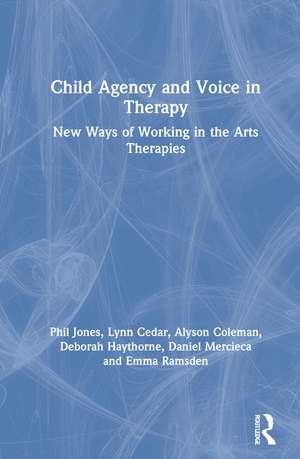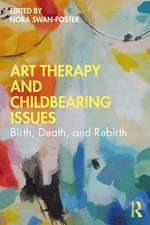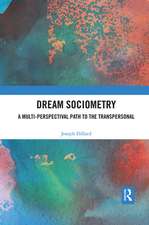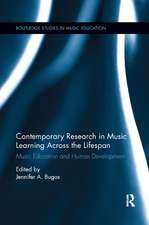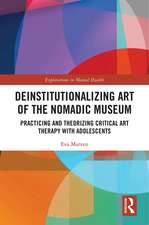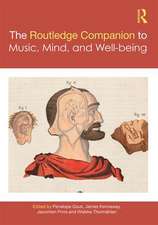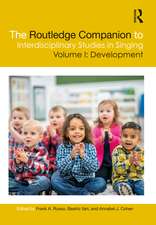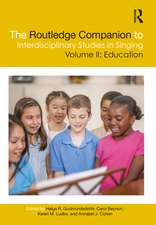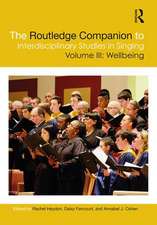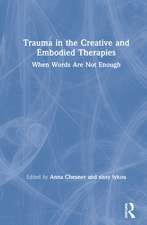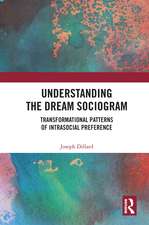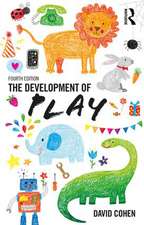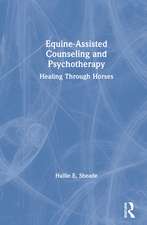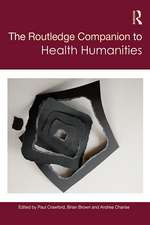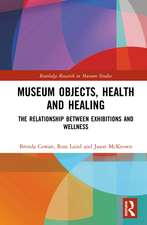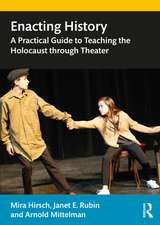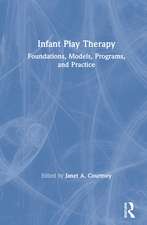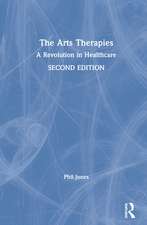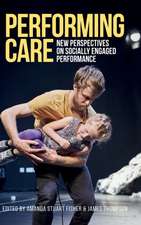Child Agency and Voice in Therapy: New Ways of Working in the Arts Therapies
Autor Phil Jones, Lynn Cedar, Alyson Coleman, Deborah Haythorne, Daniel Mercieca, Emma Ramsdenen Limba Engleză Hardback – 24 noi 2020
The book:
- considers different practices such as respecting the rights of the child in therapy and recognising and listening to children as ‘active agents’ and ‘experts’;
- features approaches that: access children’s views of their therapy; engage with them as researchers or co-researchers; and that use play and arts-based methods;
- draws on arts therapies research in ways that enable insight and learning for all those engaged with children’s therapy and wellbeing;
- considers how the contexts of the therapy, such as a school or counselling centre, relate to the ways children experience themselves and their therapy in relation to rights, agency and voice.
| Toate formatele și edițiile | Preț | Express |
|---|---|---|
| Paperback (1) | 196.69 lei 6-8 săpt. | |
| Taylor & Francis – 24 noi 2020 | 196.69 lei 6-8 săpt. | |
| Hardback (1) | 1097.20 lei 6-8 săpt. | |
| Taylor & Francis – 24 noi 2020 | 1097.20 lei 6-8 săpt. |
Preț: 1097.20 lei
Preț vechi: 1154.95 lei
-5% Nou
Puncte Express: 1646
Preț estimativ în valută:
209.97€ • 217.88$ • 175.50£
209.97€ • 217.88$ • 175.50£
Carte tipărită la comandă
Livrare economică 15-29 martie
Preluare comenzi: 021 569.72.76
Specificații
ISBN-13: 9780367861650
ISBN-10: 0367861658
Pagini: 242
Ilustrații: 6 Line drawings, black and white; 8 Halftones, black and white; 1 Tables, black and white; 14 Illustrations, black and white
Dimensiuni: 156 x 234 x 18 mm
Greutate: 0.49 kg
Ediția:1
Editura: Taylor & Francis
Colecția Routledge
Locul publicării:Oxford, United Kingdom
ISBN-10: 0367861658
Pagini: 242
Ilustrații: 6 Line drawings, black and white; 8 Halftones, black and white; 1 Tables, black and white; 14 Illustrations, black and white
Dimensiuni: 156 x 234 x 18 mm
Greutate: 0.49 kg
Ediția:1
Editura: Taylor & Francis
Colecția Routledge
Locul publicării:Oxford, United Kingdom
Public țintă
Postgraduate, Professional, and Professional Practice & DevelopmentCuprins
List of figures; Authors; Forewords; Introduction; Glossary; Part 1 Debates and Key Concepts; 1 Child Agency, Voice and the Arts Therapies: A New Paradigm; 2 The Constructions of Children in Therapy; 3 Rethinking the Therapeutic Process; 4 The Arts Therapist: Revising Roles and Relationships; 5 Research, Children and Therapy; Part 2 Research; 6 Contexts and Collaboration: Part 2 - Research; 7 The Therapeutic Process: Research into Children’s Views on their Therapy; 8 Therapist Perspectives on Child Agency and Voice: Opportunities and Challenges; 9 First Contacts: Referral, Consent and Assent Revisited; 10 Opinions of Worth: The Art of Researching CHild Cllient Views about Their Therapy; 11 Child Agency, Voice and the Arts Therapies: Key Concepts Revisited; Appendices; Index
Notă biografică
Phil Jones, Professor of Children’s Rights and Wellbeing, Institute of Education, University College London.
Lynn Cedar, CEO of Roundabout, Dramatherapy charity.
Dr Alyson Coleman, Lecturer in drama and movement therapy, Royal Central School of Speech and Drama.
Deborah Haythorne, CEO of Roundabout, Dramatherapy charity.
Daniel Mercieca, Clinical Coordinator of Adolescent Services, Caritas Malta.
Dr Emma Ramsden, Practitioner-Researcher and Clinical Supervisor based in London.
Lynn Cedar, CEO of Roundabout, Dramatherapy charity.
Dr Alyson Coleman, Lecturer in drama and movement therapy, Royal Central School of Speech and Drama.
Deborah Haythorne, CEO of Roundabout, Dramatherapy charity.
Daniel Mercieca, Clinical Coordinator of Adolescent Services, Caritas Malta.
Dr Emma Ramsden, Practitioner-Researcher and Clinical Supervisor based in London.
Recenzii
‘By drawing together an approach that both empowers children and builds on their creative potential, this fascinating and timely publication offers profound new insights into how we can explore children’s capacities as agents and partners in the therapeutic relationship.’
Gerison Lansdown, founder director of the Children’s Rights Alliance for England; former Vice Chair of UNICEF-UK
‘This is an important and timely book about the challenge of children’s well-being, rights and the practice of arts-based therapies. Its timeliness lies in the way that it resonates with social and educational policy concerns being articulated across the world. Its importance lies in the careful articulation of a new paradigmatic way to think about working with children as partners with voices that must be heard and respected. The interconnections that are developed between different ideas drawn from a wide range of disciplines, and the exemplification of how these ideas can be used rigorously in a range of settings and contexts to benefit young people, is an exemplar of how research in this area should be enacted. This is a book that needs to be widely read, and it will provide fresh insights and vision desperately needed to fulfil society’s responsibilities towards its young people.’
Professor Geoff Hayward, Head of Faculty of Education, University of Cambridge
‘This new volume provides a remarkable, timely and necessary contribution to the children’s rights literature and to our understandings of therapy. Critically examining and challenging how children’s rights have been traditionally conceptualized and children’s therapy services have been conceived, the authors propose innovative and effective ways to think about and implement best therapeutic practices for, and with, children. Giving a "voice" to children, considering them as "experts" in therapy and engaging them as "co-researchers", not only constitute what the authors call a "new paradigm", it fundamentally establishes an ethic of children’s rights to, and within, therapy. The book addresses how creativity and arts processes within the arts therapies enable such agency and voice.
Well-researched and written in a clear and accessible style, augmented with case study research illustrations, interviews with arts therapists and artworks created by children, this book will bring essential knowledge to students and professionals from across the arts therapies and to other health practitioners who hold the wellbeing of children close to their hearts. This volume not only recognizes children’s rights and affirms the need to fully and sensitively respect them, it is also committed to reflect on these rights. Interested readers will benefit from this rich reflective process the authors invite us to engage in.’
Dr Josée Leclerc, Director, Art Therapy Master’s Program, Concordia University, Montreal
‘This is an important book offering a new paradigm for arts therapy and children based on a recognition of children’s agency and voice. It will be of interest not only to arts therapy practitioners but also to other professionals who work with children and want to find out how to do so in ways that better respect, protect and fulfil children’s rights.’
Professor Laura Lundy, Co-Director of the Centre for Children’s Rights, Queen’s University, Belfast; Co-Editor in Chief, International Journal of Children’s Rights.
‘This is an essential book for all those working with children in education and therapy. Although the contents focus on the arts therapies, it is relevant to all those working with children. The authors include convincing evidence that adults make assumptions about children’s needs, rather than having time and patience to understand children’s rights, and to listen to the voice of the child. The research has been conducted with absolute rigour that convinces us to listen and pay attention to the authors. Some of it will stop us in our tracks to re-think how we work, and the adult constructs we hold when reflecting on childhood. The book describes how children were involved in planning what was important in the therapeutic space, and suggesting important themes in the therapeutic process. Throughout the book you can hear that children are at the forefront of the core thinking of this new paradigm. I would hope that policy makers and civil servants in health, education and social services would read and take on board the convincing research that is presented. It is thorough, convincing and immensely readable.’
Professor Sue Jennings, The Shakespeare Institute, University of Birmingham
Gerison Lansdown, founder director of the Children’s Rights Alliance for England; former Vice Chair of UNICEF-UK
‘This is an important and timely book about the challenge of children’s well-being, rights and the practice of arts-based therapies. Its timeliness lies in the way that it resonates with social and educational policy concerns being articulated across the world. Its importance lies in the careful articulation of a new paradigmatic way to think about working with children as partners with voices that must be heard and respected. The interconnections that are developed between different ideas drawn from a wide range of disciplines, and the exemplification of how these ideas can be used rigorously in a range of settings and contexts to benefit young people, is an exemplar of how research in this area should be enacted. This is a book that needs to be widely read, and it will provide fresh insights and vision desperately needed to fulfil society’s responsibilities towards its young people.’
Professor Geoff Hayward, Head of Faculty of Education, University of Cambridge
‘This new volume provides a remarkable, timely and necessary contribution to the children’s rights literature and to our understandings of therapy. Critically examining and challenging how children’s rights have been traditionally conceptualized and children’s therapy services have been conceived, the authors propose innovative and effective ways to think about and implement best therapeutic practices for, and with, children. Giving a "voice" to children, considering them as "experts" in therapy and engaging them as "co-researchers", not only constitute what the authors call a "new paradigm", it fundamentally establishes an ethic of children’s rights to, and within, therapy. The book addresses how creativity and arts processes within the arts therapies enable such agency and voice.
Well-researched and written in a clear and accessible style, augmented with case study research illustrations, interviews with arts therapists and artworks created by children, this book will bring essential knowledge to students and professionals from across the arts therapies and to other health practitioners who hold the wellbeing of children close to their hearts. This volume not only recognizes children’s rights and affirms the need to fully and sensitively respect them, it is also committed to reflect on these rights. Interested readers will benefit from this rich reflective process the authors invite us to engage in.’
Dr Josée Leclerc, Director, Art Therapy Master’s Program, Concordia University, Montreal
‘This is an important book offering a new paradigm for arts therapy and children based on a recognition of children’s agency and voice. It will be of interest not only to arts therapy practitioners but also to other professionals who work with children and want to find out how to do so in ways that better respect, protect and fulfil children’s rights.’
Professor Laura Lundy, Co-Director of the Centre for Children’s Rights, Queen’s University, Belfast; Co-Editor in Chief, International Journal of Children’s Rights.
‘This is an essential book for all those working with children in education and therapy. Although the contents focus on the arts therapies, it is relevant to all those working with children. The authors include convincing evidence that adults make assumptions about children’s needs, rather than having time and patience to understand children’s rights, and to listen to the voice of the child. The research has been conducted with absolute rigour that convinces us to listen and pay attention to the authors. Some of it will stop us in our tracks to re-think how we work, and the adult constructs we hold when reflecting on childhood. The book describes how children were involved in planning what was important in the therapeutic space, and suggesting important themes in the therapeutic process. Throughout the book you can hear that children are at the forefront of the core thinking of this new paradigm. I would hope that policy makers and civil servants in health, education and social services would read and take on board the convincing research that is presented. It is thorough, convincing and immensely readable.’
Professor Sue Jennings, The Shakespeare Institute, University of Birmingham
Descriere
Child Agency and Voice in Therapy offers innovatory ways of thinking about, and working with, children in therapy.
